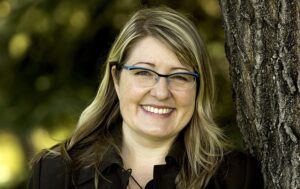Community collaboration: new book reflects on meaning of Living in Indigenous Sovereignty

By Laura E. Young
SUDBURY – In a land as vast as Turtle Island, understanding what it means to live in Indigenous sovereignty is a big question and a mightier action.
But Elizabeth Carlson-Manathara and Gladys Rowe offer some ideas and thoughts on that very question in their new book, Living in Indigenous Sovereignty, from Fernwood Publishing.
The book was officially launched on May 20, for Carlson-Manathara, an assistant professor in social work at Laurentian University.
Living in Indigenous sovereignty means living in an awareness that this is Indigenous land, a land that has its own stories, protocols, and laws, she says.
“The book is looking at completely reorienting yourself. It’s all about relationships and building relationships with actual people and spending time together learning and attending things together.”
The book evolved out of her Ph.D. dissertation of 2017, yet, she was well aware that many dissertations just sit on the shelves or in digital format in a library.
“The whole purpose of my scholarship is social change, especially around social justice and for me, especially around colonialism,” she says. “I really believe in the idea of public scholarship, too, and having my work accessible to the public. I know that with the book, there are some barriers but they are a lot [fewer] barriers than with the dissertation.”
And that is why Carlson-Manathara is also part of the team developing Stories on Decolonization, a film project that puts faces and voices to the discussion in her book. The film project was another way to make the “learnings really accessible,” she adds.
The team has received funding to have subtitles included in the Ojibwe, Cree, English, and French languages.
“It helps manifest our vision of that accessibility and public education. To me, the public needs to have access to your work if you’re going to have social change happen.”
Living in Indigenous sovereignty is told through 13 chapters based on the stories of non-Indigenous peoples who are engaged in decolonial work.
Aimee Craft, Leona Star, and Dawnis Kennedy were part of the group that wrote the book’s introduction.
Carlson-Manathara’s Ph.D. research started with interviews in 2014-15. She proposed the book form of her Ph.D. to Fernwood Publishing of Winnipeg in 2018.
“It’s taken a while, especially with a book like this. It’s such a huge collaborative process.”
She consulted with the community living in Winnipeg, where she was based at the time, which included Indigenous scholars, activists and Knowledge Keepers, as well as non-Indigenous activists, mostly around the Winnipeg area, she says.
“There are a lot of ways to look at this book as far as what scholarship it stands on. So much stands on Indigenous oral and literary scholarships,” she says. “Also, though, [there’s] a small growing field that has taken off [with] settlers doing decolonization work and analyzing our roles in colonization.”
She emphasizes the community effort of the book project. Over three pages alone are devoted to the acknowledgement of those who shared in the process.
“That’s super important to me to emphasize how much community has been involved and really built it from the ground up.”
For more, visit: https://www.storiesofdecolonization.org

